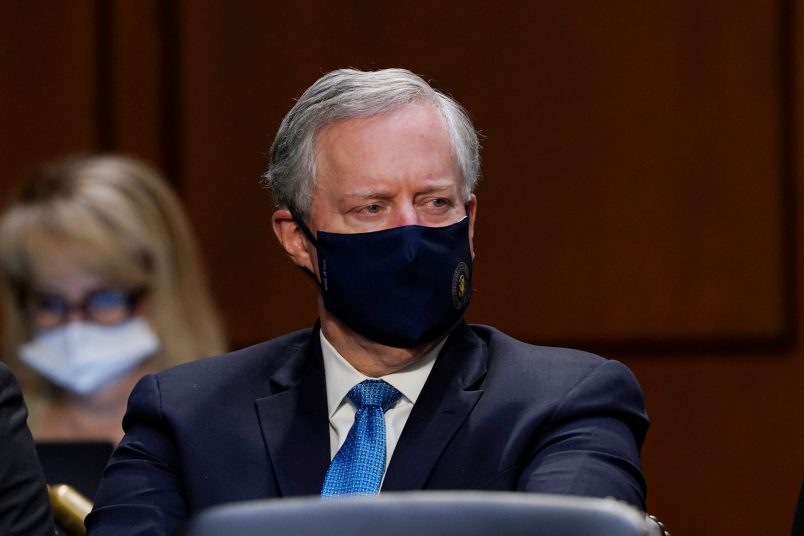The Jan. 6 select committee on Tuesday informed former White House chief of staff Mark Meadows’ lawyer that it has been “left with no choice” but to advance contempt proceedings against his client, after the panel warned that the former Trump official would be referred for contempt if he failed to show up for his deposition.
In the committee’s letter dated Tuesday, chair Rep. Bennie Thompson (D-MS) also detailed the materials that Meadows has offered up thus far during his short-lived stint of engaging with the committee, which, Thompson said, include communications documenting an early White House effort to push for the appointment of “alternate slates of electors” on the day networks called Joe Biden’s presidential victory.
Among the text messages that Meadows handed over, according to Thompson, was a Nov. 6 message from an unnamed member of Congress who texted Meadows about appointing alternate slates of electors in certain states. The lawmaker, Thompson said, acknowledged that doing so would be “highly controversial” — to which Meadows allegedly replied “I love it.”
Other text messages produced by Meadows, according to Thompson, include an early January text exchange between Meadows and an organizer of the “Stop the Steal” rally held hours before the Capitol insurrection and text messages about the need for former President Trump to issue a public statement to put an end to the attack.
According to Thompson, Meadows also provided the committee with an email from Jan. 5 regarding a 38-page PowerPoint briefing titled “Election Fraud, Foreign Interference & Options for 6 JAN” that was to be provided “on the hill” and another email on Jan. 5 about having the National Guard on standby during the joint session of Congress certifying Biden’s electoral victory.
Additionally, Thompson said, the committee had obtained data from Meadows’ personal cell phone. Meadows’ lawyer, George Terwilliger III, also produced a “privilege log” indicating that he withheld more than 1,000 text messages from Meadows’ personal cell phone based on “similarly broad claims of executive, attorney-client and other privileges,” Thompson said.
Thompson, in his letter, is not pleased with Meadows’ decision to go back to stonewalling the committee after he had begun engaging with it late last month. Terwilliger told CNN at the time that thousands of documents had been handed over and that the former Trump White House official had agreed to appear for an interview.
But on Tuesday morning, Terwilliger told the committee in a letter that Meadows took issue with the panel’s treatment of his’ “executive privilege” defense, and said that he objected to so-called recent “wide ranging subpoenas” sent by the committee to an unnamed third party communications provider.
“Contrary to your assertion, that information does not implicate privilege, but rather concerns the date, time, and dialing information about calls and messages sent or received by the specific phone numbers indicated on the subpoena,” Thompson wrote. “Moreover, production of that information does not impact Mr. Meadows’s production of documents and text messages, which are the areas we seek to develop during his deposition tomorrow.”
After noting Meadows’ stated refusal to appear for a deposition and arguing that there is “no legitimate legal basis” for Meadows not to do so, Thompson wrote that the committee is “left with no choice” but to “advance contempt proceedings” and recommend that the House refer Meadows for criminal prosecution.
Read the letter below:



